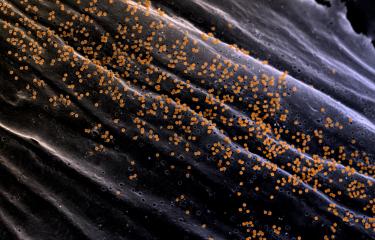Scientists at the Institut Pasteur have successfully synthesized two novel molecules that are active against several variants of the virus responsible for COVID-19. The discovery could inspire new families of antiviral drugs against future emerging viral diseases.
The availability of SARS-CoV-2 vaccines and the first antiviral drugs at the end of 2020 led to a reduction in the number of infections and the severity of the disease. But the emergence of new variants and the waning effectiveness of vaccines over time mean that SARS-CoV-2 is only partly under control. So there is still a need for the development of new treatments to combat this and other coronaviruses that may emerge in future.
Antivirals are a category of drugs whose role is to interfere with the life cycle of certain viruses. Although they do not eliminate viruses, they can help the patient's body to do so. Some antivirals act by slowing down the proliferation of a virus in cells, or by inhibiting the activity of proteins that are essential for its survival and development.
Two effective molecules to inhibit SARS-CoV-2 replication
In a study published on January 25 in the journal RSC Medicinal Chemistry, scientists from the Institut Pasteur and their partners (see source) explain how they synthesized a series of original molecules. The molecules were then tested for their ability to inhibit SARS-CoV-2 replication in infected lung cells. "Of the 25 molecules that we produced, two proved to be active not only against the variant that emerged in Wuhan but also against the Omicron variant", confirms Paola Arimondo, Head of the Epigenetic Chemical Biology Unit at the Institut Pasteur. These compounds, which were inspired by natural product structures, have an original modular 3D structure. The research, funded by the Fondation de France, paves the way for the development and optimization of promising novel antiviral compounds.
This study comes under the Emerging Infectious Diseases priority scientific area in the Institut Pasteur's 2019-2023 Strategic Plan.
Source
Design and synthesis of naturally-inspired SARS-CoV-2 inhibitors
Haitham Hassan,*a Jeanne Chiavaralli,b Afnan Hassan,cd Loay Bedda,cd Tim Krischuns,e Kuang-Yu Chen,e Alice Shi Ming Li,f Adrien Delpal,g Etienne Decroly,g Masoud Vedadi,fh Nadia Naffakh,e Fabrice Agou,b Sergio Mallart,a Reem K. Arafa*cd and Paola B. Arimondo*a
a Institut Pasteur, Department of Structural Biology and Chemistry, CNRS UMR no 3523 Chem4Life, Epigenetic Chemical Biology, Université Paris Cité, F-75015 Paris, France
b Institut Pasteur, Center for Technological Resources and Research (C2RT), CNRS UMR no 3523 Chem4Life, Chemogenomic and Biological Screening platform, Université Paris Cité, F-75015 Paris, France
c Drug Design and Discovery Lab, Zewail City of Science and Technology, 12578 Cairo, Egypt
d Biomedical Sciences Program, University of Science and Technology, Zewail City of Science and Technology, 12578 Cairo, Egypt
e Institut Pasteur, Unité Biologie des ARN et Virus Influenza, CNRS UMR3569, Université Paris Cité, F-75015 Paris, France
f Department of Pharmacology and Toxicology, University of Toronto, Canada
g CNRS – UMR7257 – AFMB – Aix-Marseille Université, Marseille, France
h QBI COVID-19 Research Group (QCRG), San Francisco, CA, USA





